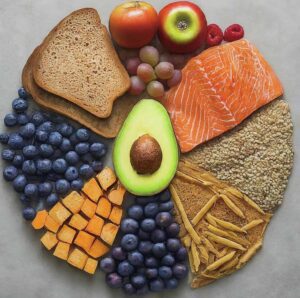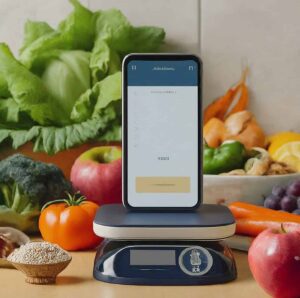Calorie counting is a frequently discussed but often confusing topic. Let me clear the air and provide you a simple, actionable guide to navigate this.
What are Calories, Really?
Imagine a calorie as a unit of heat, measuring the energy your body gets from food.
Getting more technical, a calorie it’s the amount of heat energy it takes to increase the temperature of a gram of water by 1°C

Just by being alive you generate heat and therefore you “burn” calories. The more you move, the more heat you generate and the more calories you consume.
Food labels offer estimates based on standard calculations (check this video to understand what these are), not absolutely precise measurements for every bite. Even if estimates, they are accurate enough for your purposes of tracking your food.
Calories Do Matter, But Not All Are Equal
In the simplest possible way to understand that fat loss happens in a caloric deficit, the concept of “calories in, calories out” as in: “you need to eat less calories than you use” holds some truth, but it’s there is more behind it that can make the process different and more sustainable.
What is that?
Understanding what those calories are made of. A 1000 calories from ice cream differ vastly from a 1000 calories from fruits, vegetables, or lean meats.
These provide essential macronutrients like protein (more on protein here), carbs, and fats, as well as micronutrients like vitamins and minerals, crucial for health and body composition.
Think of it in these terms:
- Calories make you lose fat
- Macronutrients make you look “good”
- Micronutrients make you feel great
Macronutrients priority?
There are 3 macronutrients – or Macros – and these are:
- Protein (more on protein here again lol)
- Carbohydrates – carbs
- Fats
They’re all equally important in a balanced nutrition but, for the sake of simplicity, let’s focus on their priority when it comes to fat loss.
- Protein comes first. This will help you to preserve as much lean mass (muscle) as possible while you’re losing fat. How much protein during a calorie deficit period?
- If you’re not particularly active: Aim for at the very very very least for 1 gram1 per kg of bodyweight every day.
- If you’re active (or very active): aim for higher dosages such as 1.2-2.4 grams2 of protein per kg of bodyweight every day. The range is wide, so you can adjust it to tailor your nutrition and activity level.
- Carbohydrates and fats. They are essential to your body and energy needs. You can mix and match their quantity to your preference. As fat is higher in calories, usually around 20-25%3 of your daily calories with that should be plenty but ultimately that depends on what you find easier.

The Messy But Necessary Part: Tracking
Tracking calories and macros can be tedious, but unless you’re buying pre-packaged meals, measuring your food is crucial for understanding your daily intake and your long term success.
The more you understand what you eat, the easier will be in the long term to make informed choices. Do you need to calculate your daily calories goal? Check my free calories calculator here!
Breathe, relax, no need to panic and spend hours to track right away. Start small! Pick one meal, the easiest one for you, it could be breakfast, lunch, dinner, the 4pm snack or the Netflix and chill snack.
When you choose that one meal, measure and track all the foods (RAW, before cooking them) in it for a full week, once it becomes a routine, you can start looking at adding another meal (or snack to track) for another full week.
Gradually increase tracking as you get comfortable and used to it.
There are a ton of apps for iOS and Android that can immensely help you tracking things. Many can also scan barcodes for you to make things even faster.

You’re going to need a kitchen scale to measure food, you can find any on amazon, I personally recommend you get one that can go up to 5 kgs as it’s easier to then consider big portions for food prep (are you starting a diet? check this out).
Consistency And Progress Win, Not Perfection
Don’t stress about being overly precise, especially when you start. Aim to stay in a +/- 10% calorie range around your target daily calorie goal.
Enjoy occasional indulgences without guilt (can you eat that cake tomorrow? Find out here) ; they won’t ruin your progress if you get back on track. Your fat loss journey, is a marathon, not a sprint. Long term success is built piece by piece without rushing.
Small consistent progress is very sustainable and will help you keep off the fat you lose instead of gaining it all back if you are too strict too fast and aim for the short term win.
Learning and Adapting for Success In The Long Run
Losing fat requires dedication and time so that you can find the best mix that works for you and you only. Experiment, track your progress, and adjust your approach as needed.
Find what works for you and don’t hesitate to seek guidance from professionals such as registered dietitians and/or nutritionists and definitely not fitfluencers trashy scammers that just want to sell you useless detox teas or fat burning supplements.
Be very aware of those people and their bullshit and don’t let them fool you.
Small, consistent changes lead to lasting results. There is no finish line, celebrate the small victories and enjoy the process towards a new you.

Addressing Concerns and Myths to Help You Succeed
- Concern: Calorie counting is absolutely negative and just promotes an unhealthy relationship with food.
- Reality: It can be a tool for mindful eating, helping you understand your food choices and make informed decisions without guilt.
- Be Aware: If you do find yourself obsessing over hitting your calories to the dot, every single day and going out of your mind if you don’t, that’s a signal that you might want to take a few days off.
- Myth: “Carbs are inherently bad for you and your health”
- Reality: Balance is essential. Include all 3 macronutrients and enjoy occasional “comfort foods” to support your mental health during calorie deficits. It might just help you crush your goals, rather than feeling deprived and losing steam.
- Myth: “spot fat reduction” is possible AKA lose belly fat with this exercise!
- Reality: This is 100% ABSOLUTELY impossible and it has been demonstrated in clinical trials too (here and here). In a consistent calorie deficit, your body randomly sheds fat from various storage sites. It’s all about your unique physiology. In my case, I lose fat in my face first, before anywhere else. Anyone, literally anyone that tells you the opposite is either ignorant or is lying to you on purpose to try to sell you some useless product or training program.
- Concern: I will have to do calorie counting forever?!
- Reality: Tracking calories accurately at the start of your weight loss journey is crucial because it reveals your current nutritional intake and its impact on progress. While consistent tracking isn’t essential once you reach your goal, staying mindful of your food choices is. Essentially, more experience tracking translates to better long-term success.
Personalizing your Fat Loss Journey
There are things that you want to keep in mind while starting your fat loss as these will help you set a clear path and long term success.
Set realistic goals: Aim for gradual, sustainable changes based on your individual needs and activity level (sedentary, moderately active, etc.). Do you need some help setting the right goal? Check this guide out
Activity Levels: Adjust calorie goals and macronutrient ratios for optimal results.
Aim for long term and take occasional breaks: having a dinner with friends won’t ruin your progress, not hitting your calories during a long weekend vacation will not ruin your progress. All of those things actually will help you make the fat loss sustainable as long as you have clear in mind that this is a long term process.
Fat loss is a mix of healthy Habits: Combine calorie counting with other healthy habits such as strength training (you don’t need a gym for that!), walking, hiking, whatever makes you excited and gets you moving exercise and sleep for a holistic approach. There are 4 main pillars of your health, read more here.
Balance and Flexibility: I said it above but I want to make sure you don’ forget it. Allow for occasional treats and don’t restrict yourself unnecessarily.
Professional Guidance: When in doubt consider consulting a proper coach, a registered dietitian or nutritionist for personalized support.
Keep in mind
Plateaus: Fat loss is not linear, your weight fluctuates for reasons that have nothing to do with your fat loss (water retention, your period, full stomach from night before…). Keep going, keep tracking, keep being consistent, keep calorie counting. If you have been hitting your calories for REAL, not just winging it, every plateau it’s just a temporary phase and it will crumble. Read more here
Calorie counting is a tool, not a strict rulebook. Use it mindfully, experiment, and find what works best for you!
